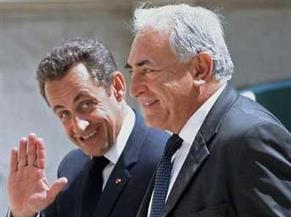|
World Jewish News

If he decides to stand for the 2012 presidential election, Dominique Strauss-Kahn (R) is possibly Nicolas Sarkozy’s most serious opponent, consistently winning strong support in the opinion polls
|
Man in the News: Dominique Strauss-Kahn, IMF boss and undeclared presidential candidate in 2012
15.02.2011, Jews and Society Dominique Strauss-Kahn, the current Managing Director of the International Monetary Fund (IMF), has built a strong reputation as a business-friendly pragmatist.
In 2007, the 61-year-old economics professor had harboured presidential ambitions but was outshone by Segolene Royal who won the Socialist nomination before her defeat to Nicolas Sarkozy in the election.
A gifted orator, Strauss-Kahn remains one of France’s most popular politicians and a leading advocate of modernizing the Socialist Party through an ideological shift toward the centre.
A fluent English and German speaker, Strauss-Kahn, popularly known in France as ‘DSK’, won respect in European circles as a competent pair of hands during his tenure as Finance Minister under Prime Minister Lionel Jospin, from 1997 to 1999.
During this time, he shepherded negotiations on the creation of the euro single currency and oversaw a wave of privatisations including at France Telecom, overcoming resistance within socialist ranks.
The silver-haired politician also reluctantly backed the key socialist reform of the period, the 35-hour working week.
Born to a Jewish family in the Paris suburb of Neuilly-sur-Seine, Strauss-Kahn spent part of his childhood in Morocco and later studied at the Paris Institute of Political Studies SciencesPo) and the Hautes Etudes Commerciales (HEC) schools.
He entered politics in 1986, winning a seat in parliament for the
Haute-Savoie region and was re-elected in the Paris region of Val d’Oise in 1988.
Former president Francois Mitterrand appointed him junior minister for trade and industry in 1991, a position he held until 1993.
But he left politics in 1994 to work as a consultant, offering his services as a corporate lawyer to businessman Vincent Bollore and former Renault boss Raymond Levy despite criticism from his fellow Socialists.
In 1995, he was elected mayor of Sarcelles, a city outside Paris with a large Jewish population, and married journalist Anne Sinclair, one of France’s most popular television interviewers.
It was President Sarkozy who backed his candidacy to the IMF highest position in 2007.
If he decides to stand for the 2012 presidential election, Strauss-Kahn is possibly Sarkozy’s most serious opponent, consistently winning strong support in the opinion polls, but his eventual candidacy could spark divisions on the left.
EJP
|
|
